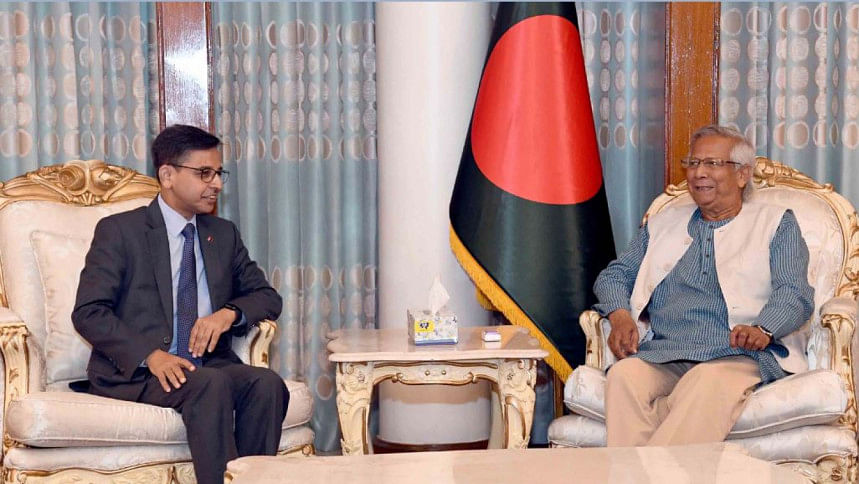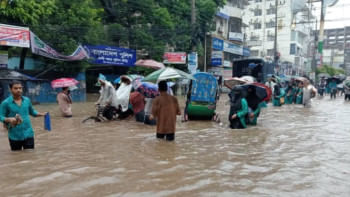Chief adviser proposes high-level Bangladesh-India mechanism for flood response

Chief Adviser Professor Muhammad Yunus has shared the idea of developing a high-level mechanism between Bangladesh and India to jointly tackle emergency situations like floods.
This suggestion was shared during a courtesy meeting with Indian High Commissioner to Bangladesh Pranay Verma at the state guesthouse Jamuna yesterday.
He also referred to flag meetings that Border Guard Bangladesh (BGB) and Border Security Forces (BSF) hold on an emergency basis when Indian High Commissioner to Bangladesh Pranay Verma had a courtesy meeting with the Chief Adviser at state guesthouse Jamuna on Thursday.
Briefing the media at Foreign Service Academy after the introductory meeting, Chief Adviser's press secretary Shafiqul Alam said Prof Yunus laid emphasis on high-level collaboration on water issues and activating this in emergency situations.
Alam said the issue of rainfall and floods in Tripura came up in the discussion.
On the flood issue, the press secretary, quoting the envoy, said water was "released automatically" due to the water level rising. "The water was very high."
The high commissioner described the flood in Tripura as something "very unprecedented," causing displacement of 50,000 people. He said it has created havoc on both sides of Bangladesh and India.
Prof Yunus said water-sharing of the joint rivers can be resolved through working together and referred to the Indus Waters Treaty between India and Pakistan.
He also said Bangladesh is a "big family".
Minority issues were also discussed at the meeting.
Prof Yunus had earlier said that the reports of attacks on the minorities have been "exaggerated" and invited Indian journalists to visit Bangladesh and report from the ground on the issue.
The chief adviser told Indian Prime Minister Narendra Modi that his government is committed to safeguarding every citizen of the country including the minorities when Modi raised the issue during a telephone conversation.
At the meeting today, the chief adviser also talked about BIMSTEC and SAARC, and laid emphasis on bringing young people together in South Asia.
Prof Yunus also talked about his good relations with India where he has many friends. Yunus Center is operational in 18 Indian universities.
He also talked about a world of three zeros - the new economics of zero poverty, zero unemployment, and zero net carbon emissions.
High Commissioner Verma reiterated India's commitment to working with Bangladesh to fulfil the shared aspirations of the people of Bangladesh and India for peace, security and development.
They exchanged views on issues of shared interest and discussed avenues to further strengthen people-to-people ties.

 For all latest news, follow The Daily Star's Google News channel.
For all latest news, follow The Daily Star's Google News channel. 



Comments